

History, Travel, Arts, Science, People, Places. Why New Mothers Stop Breast-Feeding. While nearly all mothers start breast-feeding their newborns, about half stop after a few weeks.
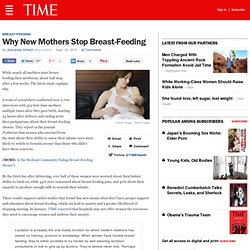
The latest study explains why. A team of researchers conducted over 2,700 interviews with 532 first-time mothers multiple times after they gave birth, starting 24 hours after delivery and ending at 60 days postpartum, about their breast-feeding choices. They report in the journal Pediatrics that women who worried from the start about their ability to nurse their infants were more likely to switch to formula sooner than those who didn’t have these concerns. (MORE: Is the Medical Community Failing Breast-Feeding Moms?)
‘Babywise’ Linked to Babies' Dehydration, Failure to Thrive. By Matthew Aney, M.D.
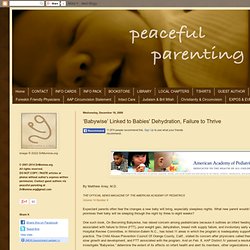
THE OFFICIAL NEWS MAGAZINE OF THE AMERICAN ACADEMY OF PEDIATRICSVolume 14 Number 4 Expectant parents often fear the changes a new baby will bring, especially sleepless nights. What new parent wouldn’t want a how-to book that promises their baby will be sleeping through the night by three to eight weeks? One such book, On Becoming Babywise, has raised concern among pediatricians because it outlines an infant feeding program that has been associated with failure to thrive (FTT), poor weight gain, dehydration, breast milk supply failure, and involuntary early weaning.
A Forsyth Medical Hospital Review Committee, in Winston-Salem N.C., has listed 11 areas in which the program is inadequately supported by conventional medical practice. I have reviewed numerous accounts of low weight gain and FTT associated with “Babywise” and discussed them with several pediatricians and lactation consultants involved. Study characterizes epigenetic signatures of autism in brain tissue. Neurons in the prefrontal cortex of individuals with autism show changes at numerous sites across the genome, according to a study being published Online First by the Archives of General Psychiatry, one of the JAMA/Archives journals.
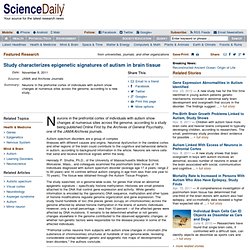
Autism spectrum disorders are a group of complex illnesses with different causes and origins. Neuronal dysfunction in the cerebral cortex and other regions of the brain could contribute to the cognitive and behavioral defects in autism, according to background information in the article. Neurons are nerve cells that send and receive electrical signals within the body.
Hennady P. Shulha, Ph.D., of the University of Massachusetts Medical School, Worcester, Mass., and colleagues examined the postmortem brain tissue of 16 individuals diagnosed with autism spectrum disorder (average age 17.4 years; range 2 to 60 years) and 16 controls without autism (ranging in age from less than one year to 70 years). Sleep Problems. Time to Abolish Cribs? By Jan Hunt, M.Sc.
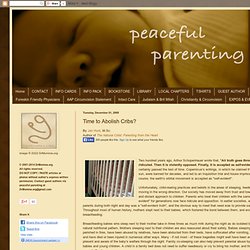
Author of The Natural Child: Parenting from the Heart. Secrets to Creating a Child-Friendly Garden. Some people make it look so easy.
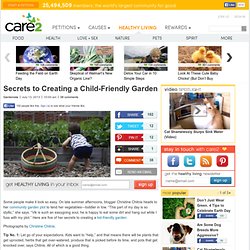
On late summer afternoons, blogger Christine Chitnis heads to her community garden plot to tend her vegetables—toddler in tow. “This part of my day is so idyllic,” she says. “Vik is such an easygoing soul, he is happy to eat some dirt and hang out while I fuss with my plot.” Here are five of her secrets to creating a kid-friendly garden: 5 Retarded Health Campaigns That Backfired (Hilariously) Can you imagine how unhealthy we'd be if we didn't have large organizations spending millions on public health campaigns?

Why A Teen Who Talks Back May Have A Bright Future : Shots - Health News. Hide captionGood arguments can provide lessons that last a lifetime.
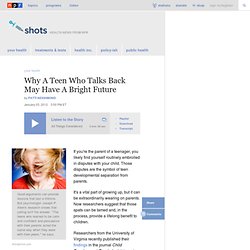
But psychologist Joseph P. Allen's research shows that yelling isn't the answer. Babies: Not Designed to Sleep Alone. By Dr.
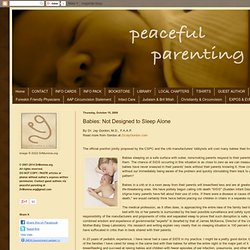
Jay Gordon, M.D., F.A.A.P. What is done to children... Peaceful parenting. Baby/child development.
SIDS. Dare to Raise Your Kids Drug Free. We teach our children about drugs - what they are, not to take them, how to avoid them, how they harm their bodies and distort their minds - but what about the drugs we as parents give to our children when they have a runny nose, fever, sore throat or the scheduled immunizations?

Is there really any difference? Well, yes there is a difference, yet those over-the-counter and prescription drugs, like their illegal counter-parts, canand do ultimately cause harm to our children's bodies. But do we dare to raise our children without the use of drugs? Most people would say it's impossible. Granted, there are times when drugs are what's needed and they should not be totally avoided, but most of the time natural alternatives are the safest and more beneficial road to take.
Crafts, Printables, & Recipes - Kaboose.com. Discipline & Behavior. A WOMAN'S POEM from Joe Burton. Attachment Parenting Australia. Welcome to Attachment Parenting International. Montessori Method/ philosophy. Montessori Theory. Montessori Theory In the Montessori Theory section of the Daily Montessori website we explain the foundation principles and concepts of Montessori theory that can be applied across all ages.
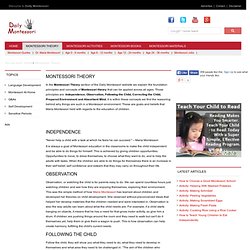
Those principles are: Independence, Observation, Following the Child, Correcting the Child, Prepared Environment and Absorbent Mind. It is within these concepts we find the reasoning behind why things are such in a Montessori environment.